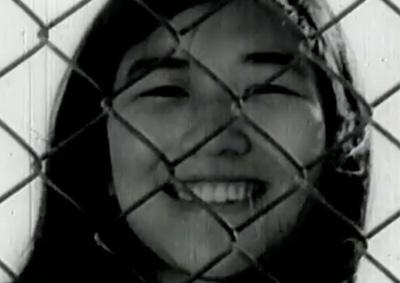Admission is free. No advance reservations. Your seat will be assigned to you when you pick up your ticket at the box office. Seats are assigned on a first come, first served basis. The box office opens one hour before the event.
Agueda Martinez: Our People, Our Country
U.S., 1977
This Academy Award–nominated short documentary offers a luminous portrait of 80-year-old Navajo great-grandmother Agueda Martinez, whose life is deeply rooted in the land of New Mexico. Sepia-toned family photos paired with Agueda’s confident voice-over ground the film as we witness intimate footage of her plowing fields, harvesting crops, tending livestock and weaving intricate serape blankets late into the night. Agueda's insightful reflections on herbs, spirituality and ancestry reveal generational knowledge sustained by a profound connection to place and ritual. This quietly powerful work stands as a timeless celebration of steadfast stewardship of sacred land.—Public Programmer Beandrea July
DCP, color, 16 min. Director: Esperanza Vasquez.
Water Ritual #1: An Urban Rite of Purification
U.S., 1979
Created with performer Yolanda Vidato, this short is a pioneering work of Black feminist and experimental filmmaking. Shot in 16mm black-and-white in an area of Watts cleared for the unbuilt I-105 freeway and later abandoned, the film follows Milanda (Vidato) through symbolic, improvisational acts that layer African, Caribbean and urban Los Angeles imagery. Structured as a ritual for filmmaker Barbara McCullough’s “participant-viewers,” it honors Black and Third World women’s beauty and self-possession while also confronting how poverty and systemic neglect shape the landscape. As the film explores themes of resilience and psychic survival, it transforms a site of urban blight into consecrated ground.—Jacqueline Stewart
35mm, color, 6 min. Director: Barbara McCullough.
Restored by the UCLA Film & Television Archive. Funded with a grant from the National Film Preservation Foundation’s Avant-Garde Masters Grant Program funded by The Film Foundation.
Wong Sinsaang
U.S., 1971
Opening with the hiss of steam machines and the chatter of white customers in his father’s Silver Lake dry cleaning business, this short contrasts stereotype with intimacy, revealing Mr. Wong’s rich inner life. By narrating his own conflicted feelings of admiration and frustration and juxtaposing the grind of the laundromat — where Mr. Wong endures daily humiliations — with serene images of him practicing tai chi and writing poetry, Eddie Wong crafts a bittersweet document of immigrant labor and his father’s search for dignity and prosperity.—guest programmer Josslyn Luckett
DCP, b&w, 12 min. Director: Eddie Wong.
I Don’t Think I Said Much
U.S., 1975
This tender portrait of Japanese American gardener Elmer Uchida blends documentary and fiction, opening with still photographs and disembodied voices before unfolding in slow-motion scenes of his daily work. Archival material, scripted commentary and intimate voice-over enrich the portrait, while UCLA Ethno-Communications filmmaker Jeff Furumura transforms the rhythms of gardening and Suiseki (Japanese rock appreciation) into poetic meditations on dignity and beauty. The result is a film that honors the quiet artistry and depth of a life too often overlooked.—guest programmer Josslyn Luckett
DCP, b&w, color, 16 min. Director: Jeff Furumura.
The Horse
U.S., 1973
In this film based on writer-director Charles Burnett’s unpublished short story, a young Black boy gently comforts a horse fated to be killed on a remote California ranch. As three white men look on and hurl racial slurs at his absent father, tension builds. When the father (played by fellow UCLA Ethno-Communications alum Larry Clark) arrives, Burnett, exercising noticeable restraint, captures a fleeting moment of tenderness before shifting to the grim task at hand. Through the boy’s gaze, we feel the weight of witnessing the dehumanizing labor his father’s generation endured under white employers.—guest programmer Josslyn Luckett
35mm, color, 14 min. Director/Screenwriter: Charles Burnett.
Restored by the UCLA Film & Television Archive. Funded in part with a grant from the National Film Preservation Foundation.
Sleepwalker
U.S., 1971
This quiet, dreamlike study of solitude and the aftermath of political struggle follows an Asian American typist through long bus rides and monotonous office work. Her exhaustion is evident in aching hands and downcast glances. When she skips work for a wandering walk, fleeting moments of play and memory emerge. Shot on 16mm in black-and-white with layered imagery and a striking soundscape, the film draws on director Laura Ho Fineman’s real-life activism and isolation, validating the interiority of women of color organizers as they fully occupy their own narratives.—Public Programmer Beandrea July
DCP, b&w, 13 min. Director: Laura Ho Fineman. With: Suzi Wong.
A Crushing Love
U.S., 2009
This sequel to UCLA Ethno-Communications alum Sylvia Morales’ landmark Chicana (1979) profiles five groundbreaking Latina activists: Dolores Huerta, Elizabeth “Betita” Martinez, Cherríe Moraga, Alicia Escalante and Martha Cotera. Through archival footage, candid interviews and her own perspective as a working mother, Morales explores the costs and rewards of prioritizing protest while raising children. The film offers a deeply personal yet historically grounded portrait of resilience and leadership rooted in love for both family and community.—Public Programmer Beandrea July
DCP, color, 58 min. Director: Sylvia Morales.






 Mobile Navigation
Mobile Navigation

